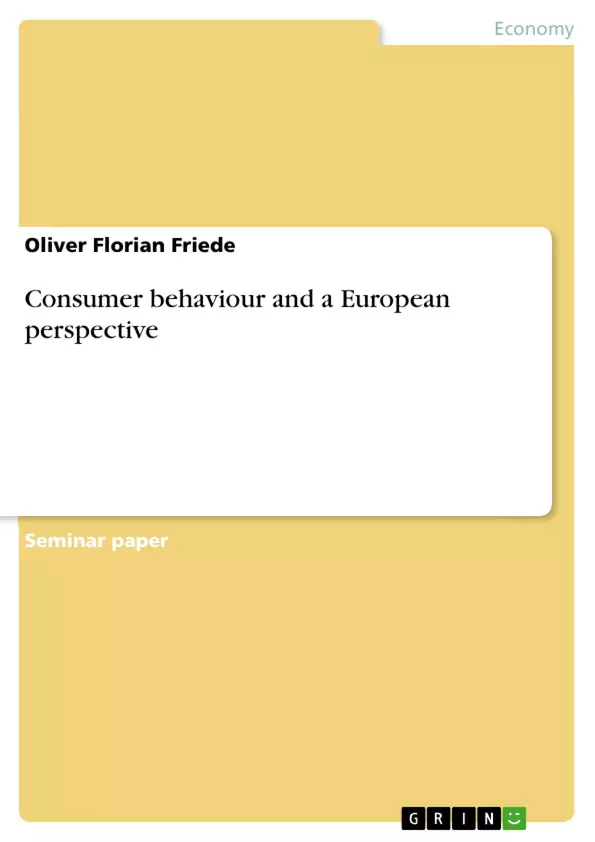One "official" definition of consumer behavior is "The study of individuals, groups, or organizations and the processes they use to select, secure, use, and dispose of pro-ducts, services, experiences, or ideas to satisfy needs and the impacts that these pro-cesses have on the consumer and society." Although it is not necessary to memorize this definition, it brings up some useful points:
Behavior occurs either for the individual, or in the context of a group (e.g., friends in-fluence what kinds of clothes a person wears) or an organization (people on the job make decisions as to which products the firm should use).
Consumer behavior within European Community involves the use and disposal of pro-ducts as well as the study of how they are purchased. Product use is often of great interest to the marketer, because this may influence how a product is best positioned or how we can encourage increased consumption. Since many environmental prob-lems result from product disposal (e.g., motor oil being sent into sewage systems to save the recycling fee, or garbage piling up at landfills) this is also an area of interest.
Nowadays, consumer behavior in EU involves services and ideas as well as tangible products.
The impact of consumer behavior on society is also of relevance. For example, ag-gressive marketing of high fat foods, or aggressive marketing of easy credit, may have serious repercussions for the national health and economy. With the unifying of EU the impact is even bigger.
Inhaltsverzeichnis (Table of Contents)
- Introduction
- Introduction to Customer Behaviour
- European Perspective
- Euro's Impact
- Characteristics of European Consumers
- Perception
- Learning and Memory
- Motivation and Values
- The Self
- Personality and Lifestyles
- Attitudes
- Attitude Change and Interactive Communications
- Decision Making Process
- Individual Deciding
- The Purchase Situation, Post-purchase Evaluation and Product Disposal
- Group Influence in Decision Making
- Family Decision Making
- Global View of Consumer Behaviour
- Income and Social Class
- Ethnic and Regional Subcultures
- Age Subcultures
- Cultural Influences on Consumer Behaviour
- The Creation and Diffusion of Culture
- Summary
Zielsetzung und Themenschwerpunkte (Objectives and Key Themes)
This document aims to provide a comprehensive overview of consumer behavior within the European Union, focusing on how the changing economic landscape of the networked economy impacts purchasing decisions. It examines the influences on consumer behavior, including cultural factors, societal trends, and individual motivations.
- Consumer behavior and its impact on European markets
- The evolution of the European Union and its impact on consumer behavior
- Key characteristics and influences on European consumers
- The decision-making process in consumer behavior
- The influence of global factors on consumer behavior in Europe
Zusammenfassung der Kapitel (Chapter Summaries)
- Introduction: This chapter introduces the concept of consumer behavior and explores its significance in the European Union context, highlighting the impacts of the evolving European marketplace on consumer behavior and the role of marketing in this landscape. It discusses the European Union's historical evolution, from the formation of the European Coal and Steel Community to the establishment of the European Union, outlining the key milestones and their implications on consumer behavior. The chapter also explores the potential impacts of the Euro on European economies and consumer behavior.
- Characteristics of European Consumers: This chapter delves into various characteristics of European consumers, focusing on their perception, learning and memory processes, motivations, values, and attitudes. It explores how these individual attributes influence their purchasing decisions. The chapter also analyzes how these characteristics are shaped by cultural and societal influences, offering insights into the complexities of understanding European consumer behavior.
- Decision Making Process: This chapter examines the factors that contribute to consumer decision-making. It explores both individual and group influences, including the roles of family and social groups, on purchasing behavior. The chapter further examines how consumer purchase situations, post-purchase evaluation, and product disposal affect future purchasing decisions.
- Global View of Consumer Behaviour: This chapter takes a broader perspective on consumer behavior, examining how global factors influence purchasing decisions in the European context. It delves into the impacts of income, social class, ethnic and regional subcultures, and age subcultures on consumer preferences and behavior. The chapter also analyzes the role of cultural influences on consumer behavior, exploring how global trends and cultural diffusion impact purchasing patterns in Europe.
Schlüsselwörter (Keywords)
This document focuses on the core concepts of consumer behavior, examining key aspects of the European market and its complexities. It delves into the influence of the European Union's formation and evolution on consumer behavior, as well as the impact of the Euro on economies and purchasing decisions. It analyzes various factors influencing consumer behavior, including cultural, social, and individual characteristics, highlighting the importance of understanding the decision-making process within the European context.
- Arbeit zitieren
- Dipl.-Kaufmann techn. Oliver Florian Friede (Autor:in), 2002, Consumer behaviour and a European perspective, München, GRIN Verlag, https://www.grin.com/document/8887



